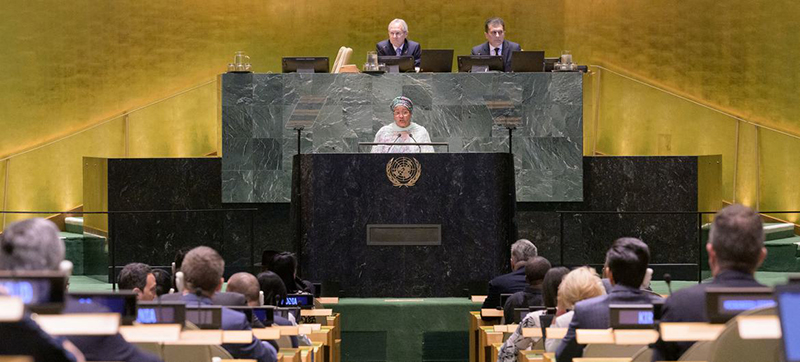UN General Assembly leadership highlights benefit of cooperation

A new session of the UN General Assembly began on Tuesday with both the outgoing and incoming leaders of the world body underscoring the importance of multilateral cooperation.
Outgoing President Csaba Kőrösi addressed the final plenary meeting of the 77th session, urging nations to work together for a sustainable future.
“Our survival depends on our cooperation,” he said, pointing to global road blocks such as accelerating climate change, biodiversity loss, education and gender inequality.
“Let us put money where our promises are,” he added, urging governments to translate actions for sustainable development into budgeting policies, national regulations and capacity building.
The 77th session, which formally commenced on 13 September last year, was distinguished by high-level events including the UN Water Conference in March that adopted a milestone action plan to protect and preserve the vital resource.
The session also saw important deliberations on disaster risk reduction, ensuring justice for all, inclusive societies, universal health coverage, and sustainable consumption and production.
Upholding the Charter
Assembly President Kőrösi recalled the three “pillars” of the United Nations - peace and security, development, and human rights - and with conflicts raging around the world, asked if the UN Charter was really being upheld worldwide.
“The war in Ukraine – along with other 51 armed conflicts – must end, in line with the UN Charter and international law,” he declared, calling also for an end to nuclear proliferation and the nuclear arms race.
Future-proof solutions
Mr. Kőrösi highlighted the need for integrated, holistic solutions that not only address current challenges but also protect against those in the future.
“We know that stand-alone processes will only deliver stand-alone results,” he said, reiterating the importance of financing and international cooperation.
Times a changin’
Mr. Kőrösi outlined the need for key UN bodies including the General Assembly and the Security Council, to reform and evolve.
“The world’s first passenger jet aircraft carried 36 passengers in 1952. It was a breakthrough in technological development,” he said.
“That doesn’t mean that we can use it today to take us to Mars…Times are evolving, and this Organization must evolve with them.”
Oath of office
Following the speech of the outgoing President inside the ornate General Assembly Hall, Dennis Francis, President-Elect of the 78th session, took the oath of office of the presidency, vowing to discharge its responsibilities to the best of his ability.
Thereafter, President Kőrösi formally handed the historic wooden gavel over to his successor, and adjourned the meeting.
‘Proving ground for multilateralism’: Deputy UN chief
Deputy Secretary-General Amina Mohammed, speaking on behalf of the Secretary-General, commended Assembly President Kőrösi for his skilful stewardship over the past year.
She praised the General Assembly for sustaining diplomacy, fostering dialogue and debate, and for working towards practical solutions for people and planet.
“Let us all commit to using this Assembly as a proving ground for multilateralism, to build trust, cohesion and solidarity among Member States, and ensure that we shape solutions that will benefit people and communities around the world,” Ms. Mohammed said.
‘Our common humanity’
In the afternoon, during the opening of the 78th session, the Deputy Secretary-General emphasized that the General Assembly represented “our common humanity” and “our shared commitment” to peace, sustainable development and human rights.
She encouraged all delegates to stay optimistic and work together to get the Sustainable Development Goals (SDGs) back on track.
“Let us forge the solutions that all people expect and make progress towards a better, more peaceful and prosperous future, and a healthier planet.”
Global solidarity: Francis
In his inaugural address at the President of the 78th session of the General Assembly, Dennis Francis, outlined his four key priorities or “watchwords” for the session: peace, prosperity, progress, and sustainability.
He acknowledged the complex challenges facing the world, including climate change, conflict, and poverty, which have made peace more elusive, while geopolitical divides have bred scepticism towards multilateral systems.
“As the UN’s chief policy making body, the General Assembly bears a special responsibility to ensure that our efforts must be anchored in a robust multilateral system, faithful to the cherished values and principles enshrined in UN Charter,” he said.
Against this background, he highlighted the Assembly’s Security Council veto initiative as a step towards transparency and accountability regarding the application of the veto.
We must accelerate the transition to clean energy ... by making climate finance more available, more accessible, and more affordable
– Assembly President Francis
Prosperity
Turning to the second watchword, the Assembly President underscored the need for tailored solutions in challenges of in conflict and post-conflict countries and urged Member States to follow through on the Addis Ababa Action Agenda.
“In doing so, we must also accelerate the transition to clean energy and boost support for adaptation by making climate finance more available, more accessible, and more affordable,” he continued.
Mr. Francis also highlighted the unique circumstances of least developed countries (LDCs), landlocked developing countries (LLDCs), and small island developing States (SIDS), urging renewed effort to follow through on their specific development agendas.
Progress
He also emphasized the importance of the SDGs and the upcoming SDG Summit as a critical opportunity to accelerate progress.
“How the Summit unfolds will set the tone for the rest of the General Assembly agenda this session; and for the 2030 Agenda over the next 7 years,” he said.
He also highlighted the need for global solidarity and cooperation in building resilient health systems in the face of the ongoing COVID-19 pandemic, as well as the need for financing to realize the ambitious development goals (SDGs).
Sustainability
Mr. Francis underlined the urgent need to address climate change and biodiversity loss, emphasizing the need for transformative climate action, as well as the critical relationship with water – the common resource fundamental to all life, yet one that remains inadequately conserved and prioritized.
“We need a green ‘blue revolution’ that addresses and indeed brings together concerns around water, climate, biodiversity, and land and soil degradation and global food security,” he highlighted.
“This is the only way to guarantee that the right to a clean and sustainable environment is upheld for all.”



